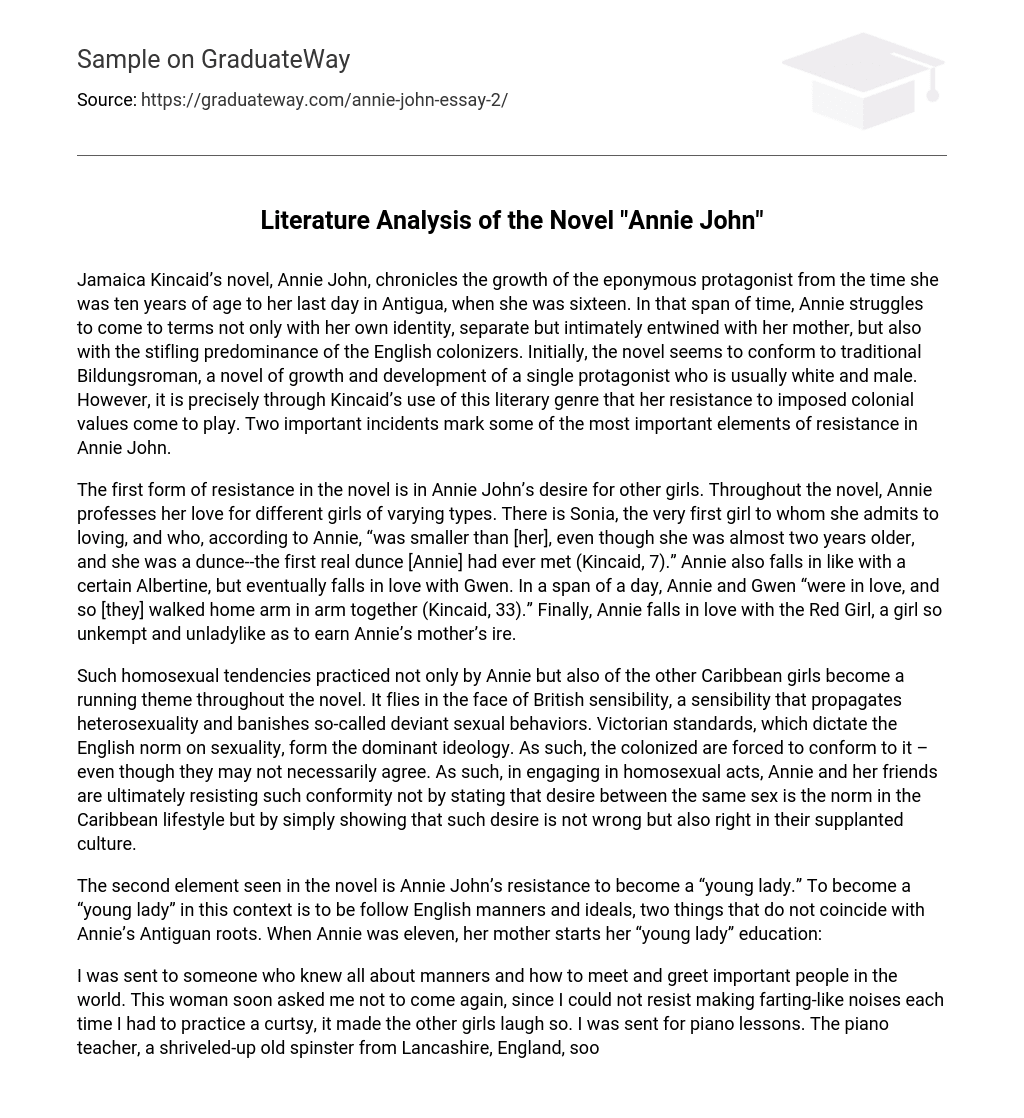Jamaica Kincaid’s novel, Annie John, chronicles the growth of the eponymous protagonist from the time she was ten years of age to her last day in Antigua, when she was sixteen. In that span of time, Annie struggles to come to terms not only with her own identity, separate but intimately entwined with her mother, but also with the stifling predominance of the English colonizers. Initially, the novel seems to conform to traditional Bildungsroman, a novel of growth and development of a single protagonist who is usually white and male. However, it is precisely through Kincaid’s use of this literary genre that her resistance to imposed colonial values come to play. Two important incidents mark some of the most important elements of resistance in Annie John.
The first form of resistance in the novel is in Annie John’s desire for other girls. Throughout the novel, Annie professes her love for different girls of varying types. There is Sonia, the very first girl to whom she admits to loving, and who, according to Annie, “was smaller than [her], even though she was almost two years older, and she was a dunce–the first real dunce [Annie] had ever met (Kincaid, 7).” Annie also falls in like with a certain Albertine, but eventually falls in love with Gwen. In a span of a day, Annie and Gwen “were in love, and so [they] walked home arm in arm together (Kincaid, 33).” Finally, Annie falls in love with the Red Girl, a girl so unkempt and unladylike as to earn Annie’s mother’s ire.
Such homosexual tendencies practiced not only by Annie but also of the other Caribbean girls become a running theme throughout the novel. It flies in the face of British sensibility, a sensibility that propagates heterosexuality and banishes so-called deviant sexual behaviors. Victorian standards, which dictate the English norm on sexuality, form the dominant ideology. As such, the colonized are forced to conform to it – even though they may not necessarily agree. As such, in engaging in homosexual acts, Annie and her friends are ultimately resisting such conformity not by stating that desire between the same sex is the norm in the Caribbean lifestyle but by simply showing that such desire is not wrong but also right in their supplanted culture.
The second element seen in the novel is Annie John’s resistance to become a “young lady.” To become a “young lady” in this context is to be follow English manners and ideals, two things that do not coincide with Annie’s Antiguan roots. When Annie was eleven, her mother starts her “young lady” education:
I was sent to someone who knew all about manners and how to meet and greet important people in the world. This woman soon asked me not to come again, since I could not resist making farting-like noises each time I had to practice a curtsy, it made the other girls laugh so. I was sent for piano lessons. The piano teacher, a shriveled-up old spinster from Lancashire, England, soon asked me not to come back, since I seemed unable to resist eating from the bowl of plums she had placed on the piano purely for decoration. (Kincaid, 27-28)
These lessons in the hands of the English eventually backfire: Annie cannot resist living out her own version of “femininity.” As her mother struggles to make her only daughter conform to the dominant model of propriety, so her daughter struggles to free herself from such a constricting mode.
What Annie defines to be the “proper” way of behavior is, again, contrary to the imposed British standards. Her farting displays and ceaseless eating – two very strict taboos for females growing up to Victorian standards – signify her desire to grow and become her own woman. Annie wants to find her own self, not to be stuffed into a predetermined mode that left little room for individuality and creativity. And in doing so, she subconsciously reverts to Caribbean culture, a culture that makes allowances for the wanton public display of bodily functions. Indeed, in this culture, such is not taboo but a given: a veritable celebration of the body.
Resistance in the novel is not so much an outward rejection of the dominant colonial but an embrace of the stifled and stilted colonized. Through Annie’s embrace of her own culture and heritage, she inevitably holds up the banner of resistance.
Works Cited
Kincaid, Jamaica. Annie John. New York: Farrar, Straus and Giroux, 1985.





